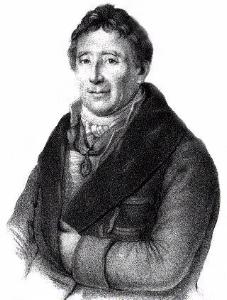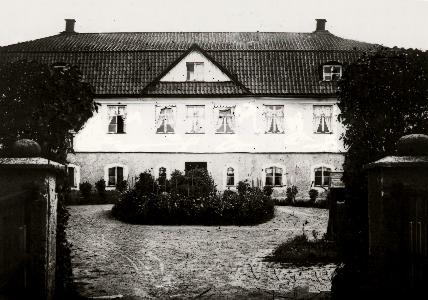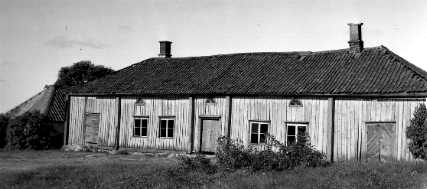
Two miles [one Swedish mile equals approximately six English miles] from Skara there still remains the old manor Höberg. At the end of the eighteenth century Major Leonard Gyllenhaal resided there. He was in many ways a remarkable man. Born at Ribbingsborg in the district of Elfsberg, the son of cornet Hans Reinhold Gyllenhaal and his wife Anna Katarina Wahlfelt, he very early showed a bent toward natural history. At that day it was considered not very remunerative to take up a professional career, and as Gyllenhaal's parents were in comparatively narrow financial circumstances, their son had to pursue a career as early as possible to supply his living. Therefore, he went into the army as was most suitable to the nobility. He became yeoman of the Royal Guard in 1773, lieutenant four years later, and captain in 1789. Ten years later he retired on a pension and was then appointed major. He lived at Höberg, which had already been bought by his father, who died there in 1796.
Höberg is an old tax-free manor, which in 1615 was owned by Kristoffer Göransson Lilliehöök. The manor continued in the family until 1685, then it was owned by the old family Kafle and in 1774 was bought by Leonard Gyllenhaal's father.

The manor had considerable acreage, and the new owner applied himself with eagerness to its cultivation. He had "le corps de logis" rebuilt into a big two-story house and put up a new cow-house. Evidently it was not so unusual at this time for agricultural and scientific interests to go hand in hand. Gyllenhaal became very well known and respected in these parts, both as large landowner and as entomologist. Being a collector he bought insects from the people and paid a twenty-five öre piece for an insect. An old woman who came to know this decided to make a great catch. She therefore collected a sackful of flies, among them horseflies. Then she went to Höberg to see the major. When she had been ushered into his room, he said with his usual kindness:
"Well, dear mother, what is on your mind?"
"My lord! God have mercy on you, but I have been told that you buy flies and such things, and I have collected a sackful of them." Saying this, she held out the sack to Gyllenhaal. When he shrank back, she added comfortingly: "There are not only house-flies, there are some horse- and cattle-flies too."
"Good mother!" Gyllenhaal exclaimed, "See, there you have twenty-five öre pieces, but please take away the sack!"
Gyllenhaal was a famous scientist not only in Sweden but also abroad. The German mineralogist Johan Haussmann paid him a visit in 1805-1806 and has described him as a strong man not only physically -- his physical strength was well known in the whole district of Västergötland -- but also spiritually.
"I learned to know him as a modest, righteous man of great learning. He is the owner of a pleasant manor, surrounded by a considerable garden, which he has by his own hands changed from a stony desert to what it is now. He has himself removed big blocks of gneiss, partly by means of blasting, and has used them for a stone wall around his garden, a practice which deserves following in Sweden. In a summerhouse he keeps his comprehensive library. The entomological collection of Swedish insects, which Gyllenhaal has, is at least as valuable as his literary treasures."
Here Haussmann mentions a summerhouse, where Gyllenhaal kept his collections. That little pavilion was used by Gyllenhaal as a study, in which he could shut himself up and work both night and day when he was in the mood for it. There is a romantic tale connected with the little pavilion, picturesquely situated among the trees of the garden. It was told to me by a Mr. Erasmie from Skara, who in his youth heard it from a lady of rank, born in 1820, and who had in turn heard it from her parents. The story tells of how late one evening in March of 1792 there came a lonely horseman riding up the avenue and into the yard in front of the manor-house. He dismounted from the horse to see if he could discover any light, but it was dark everywhere. The tenants of the house had evidently gone to bed. Then he discovered light from a little window of a tower like building down in the garden. Cautiously he stole down there and knocked at the door. After a short wait the door was opened by a servant with a lantern. "Who are you, and what do you want so late in the night?" the servant asked harshly. He was a tall and strong dragoon from Västergötland, who had after his discharge taken a situation at Höberg as a servant.
"I want to see your master," was the answer, and so saying the stranger took a signet-ring out of his pocket and gave it to the servant, saying, "Give this to your master."
The servant examined the ring suspiciously by the light of the lantern, and when he saw that it had a coat of arms he took it with him into the pavilion. Shortly afterwards he returned, followed by Gyllenhaal. The stranger approached, removed the hood of his mantle so that his face became visible, and said some words in French. Dismayed, Gyllenhaal drew him into the pavilion, and the servant was ordered to bar up all doors and windows carefully. Then he was told to go down into the garden to take care of the stranger's horse, which, at daybreak, he should take to one of the distant, unoccupied farmsteads that belonged to Höberg. On pain of losing his situation he was positively forbidden to tell anybody about the arrival of the stranger. Until late in the night there was light in the pavilion. Finally the light was extinguished and the Major came out and locked the door, carefully. Here the stranger was hidden for several weeks, taken care of by the Major and his servant. A better hiding place could certainly never be found by any fugitive. As a Törnrosa's secret castle the tower was almost inaccessibly situated in a distant corner in the garden. Food was taken there under the pretext that the Major had shut himself up there to complete an important work. After nightfall, when all others had gone to sleep, the stranger used to go out for a walk in the garden. Once it happened that he was surprised by a man-servant who was coming from a meeting with his sweetheart, and who had taken a short cut through the garden. When the servant saw the tall black form, he thought that he was meeting the prince of the damned and took to his heels at top speed.

After this occurrence the Major no longer considered his guest safe in the pavilion. Thus one fine day the pavilion was empty; but an unoccupied farmstead, the same to which the servant had taken the stranger's horse, had instead received an inmate. He called himself Karl Eriksson, saying that he had been a peddler, and now wanted to retire from business as he had gathered some money.
Here the mysterious stranger lived for several years. His occupation was to supply the manor with fish from the lakes in the neighbourhood, and to deliver the woods that belonged to Höberg from poachers. On account of this latter occupation he made many enemies, and one night was assaulted by several farmhands, who had determined to mark "that proud fellow" as was his nickname in the neighbourhood. The stranger, however, defended himself against them all and, as if in play, knocked the cudgels out of their hands, and put his assailants to flight. If the farmers had known about such things they would have understood that he was a clever fencer for whom it was very easy to fend off their blows. On the other hand a farmhand in Wänga could not possibly know about fencing.
When the Major heard about the assault he became very angry, and wanted to call the sheriff's officer, which the stranger declined, for the last thing he wanted was to attract attention.
On a Saturday evening he was subject to another and worse assault in the village of Wånga, where a number of more or less intoxicated farmers had determined to give him something to remember. If the Major and his servants had not unexpectedly appeared and scattered the farmers it is uncertain what would have happened to the bold stranger, who bled freely from a wound on the forehead.
It was doubtful how long the fugitive would have been able to live on the farmstead in the deep wood. He was a rather young man, only a little more than thirty years old, and apparently used to a different existence than that which the simple farmstead could provide. But Providence interfered and delivered him from a certainly unendurable life. One day when Gyllenhaal's servant came to the stranger with some provisions, he found him sick and fevered. The sickness turned out to be a violent case of pneumonia. Gyllenhaal wanted to send for a doctor, which the stranger declined. Possibly it was all the same to him how the sickness turned out. Life could not be of much value for him. Gyllenhaal, however, urged him to have himself bled, which at that time was done by the vestry-keeper of the society. After this the stranger apparently recovered. During the sickness the servant had taken care of him both day and night. The stranger's strength did not return, however, and, furthermore, a severe cough came on.
In order that he might be better nursed he was now moved to the manor, where a room in one of the wings was set in order for him. He moved there shortly before Christmas. Now his existence became more endurable. Well-prepared food was sent to him, and Gyllenhaal often visited him, and it is also very probable that Gyllenhaal's wife, Anna Hård, sometimes went to see him. Now he seemed to recover, and in the summer he even was so well as to take part in a hare-hunting. Yet this seemed to have been too much for him. When he came home he had a severe hemorrhage of the lungs. Immediately Gyllenhaal sent for a doctor, who after a careful examination declared that there was no hope. The patient was in the last stages of tuberculosis and had certainly a very short time left. The stranger seemed to know it himself, and asked Gyllenhaal to send for the spiritual guide of the society. This man, who was an old white-haired pastor,* stayed for a long while with the stranger. When he left him, he had a dismayed expression on his face.

The Major, who noticed this, went up to him and said:
"Has he told you...?
"Yes," the pastor answered, "he has told me everything, but as a confession, and thus the secret is well preserved."
"Thank you, pastor. Do you think that he is well prepared for the end, too?"
"Yes, I found him humble and repentant, and when I left him he was serene and submissive."
The old pastor himself watched at the stranger's bedside, who toward morning expired. Some days later he was buried in the old churchyard of Wånga. He was committed to his last resting place by the old pastor himself, and his body was accompanied to the grave by Gyllenhaal, the servant and some crofters belonging to Höberg, who lowered the simple coffin into the grave. As long as Gyllenhaal lived, up to 1840, he took care of the hillock, but after his death it has been forgotten and become leveled with the ground. Now it would be in vain to seek for the stranger's nameless grave, the earth has effaced it just as the waves of time closed over his life.
Who was the stranger on Höberg? What terrible secret, which made him flee from his home, his relatives, and everything that is of value in life? The two persons who were able to answer these questions, the pastor and Major Gyllenhaal, took the secret with them to their graves.
On the manors in north Wånga people employed their ingenuity in futile guesses concerning the mysterious stranger. Some thought that he was one of those who had taken part in the murder of Gustavus the Third, and that he had been exiled but preferred to hide himself in Sweden. Others thought that his flight was caused by a duel with fatal termination. Certainly, duels were forbidden, but at this time, full of love-intrigues, they were very common.
Naturally the reader asks who has made this story known. Of course the servant. He was very fond of strong drink, and when he had had a little too much he became talkative and let the cat out of the bag. As long as he stayed as Gyllenhaal's servant he kept his tongue under control, but when he in old age retired on a pension and settled down in the village of Wånga in a little house which his master bought for him, he loosened his tongue and told gladly everything he knew concerning the stranger. The servant had an easy-going old age, for the stranger had given him everything he had, and it was several thousand riksdaler. He is said to have also received the ring which, however, he gave to Gyllenhaal. If we could have found the ring the problem would soon have been solved, but it is lost, probably destroyed by Gyllenhaal himself. Perhaps it has been hidden in the ground somewhere on the estate and will appear some day, as often happens with old things.
Investigations have been made by the abovementioned Mr. Erasmie with no other result than that he one day received a letter from a farmer from Edsvara in Västergötland, who told him that his grandmother had been in Stockholm when Gustavus the Third was murdered. In Stockholm, the farmer said, it was rumoured at that time that Anckarström was not guilty of the murder, but that somebody else had shot the king. The farmer thought that the stranger on Höberg might have been the murderer. Some day it may be possible to find out who the stranger was, but never what his secret was. It was preserved by such a man as Leonard Gyllenhaal, who not only gave him a home, food and clothes, but also a friendship faithful unto death. No wonder that Leonard Gyllenhaal is freshly remembered by the people of Wånga, and that his photograph is still preserved on the old estate of Höberg, though the manor has several times changed owners.
Down in the garden of Höberg the now decayed pavilion is still left, from whose windows the mysterious stranger saw light on the highly memorable night in March, 1792.
*The pastor mentioned must to all judgement have been Johan Frondell, who was born in 1772 and died in 1903. At the time of this story he was pastor in Wånga, where he died a rural dean. He was very well known for his tender sympathy toward all who were sick and poor. (Warholms Herdaminnen.) Consequently he must have been the pastor that received the stranger's confession.